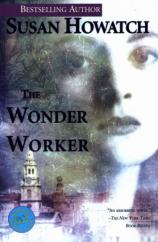Reading Group Guide
Discussion Questions
The Wonder Worker

1. This book is told from the point of view of four different characters. Do you think the author favors one character over another? If so, why and how? Which character do you feel the greatest connection with?
2. Alice is a Cordon Bleu chef with an eating disorder, which means that her greatest talent is linked to her greatest weakness. Do you see this as a theme with any of the other characters?
3. Alice's aunt doesn't seem to have given her a good sense of self-esteem, and yet Alice shows a very strong sense of duty in taking care of her. Do you see this as admirable, or as something that deprives her of her own personal growth? How would you act in a similar situation?
4. Rosalind refers to America enviously as "a culture where it was socially acceptable for angry people to scream with rage" as opposed to the stiff-upper-lip tradition of Britain. Do you think this is a fair characterization of either country? If so, how do these differences affect women's lives in particular?
5. The friendship between Nicholas and Lewis seems more durable than any of the friendships between women in this book; for instance, between Rosalind and Francie. Why do you think this is so?
6. Why do you think Francie makes untrue allegations against her husband? Do you see her as a victim or a perpetrator? Is she being manipulative, or do you think her actions are excusable because she is disturbed?
7. What is the significance of Nicholas's toy bear? What does it mean for him as a child? What relevance does it have for how he treats people as an adult?
8. Nicholas and Lewis are healers who, when they are troubled, turn to their own spiritual directors, most notably in Nicholas' session with Clare (pages 318Ð332). Do Nicholas's and Lewis's methods of healing differ from those of their own spiritual directors? If so, how?
9. The novel differentiates between being an "honest Christian healer" and a "shady, manipulative wonder worker," yet the title suggests that Nicholas might be more of the latter than the former. Do you think this is true? What are the differences you see between the two?
10. There is a lot of speculation about the reasons for Stacy's death. Why do you think he commits suicide?
11. Who do you think is stronger--Alice or Rosalind? Why?
12. Traditionally, religious figures are expected to be above sexual temptation, but all of the men of St. Benet's-by-the-Wall struggle with their sexuality. Lewis struggles with his celibacy; Stacy struggles with his sexual orientation; and Nicholas struggles with the attraction women have for him. What do you think the role of sexuality in a clergyman's life should be?
13. Nicholas is portrayed as the highly charismatic center of a small religious community--a role that has come to be viewed very suspiciously these days. Overall, do you think Nicholas's depiction in the book is more positive or negative?
14. What experiences have you had personally with highly charismatic figures, religious or otherwise? How did you react to them? Did you trust them as much as most people seem to trust Nicholas?
15. What do you think the reasons are for the breakup of Nicholas and Rosalind's marriage? Do you think it was inevitable? Is there anything either of them could have done to prevent it?
16. Rosalind has kept important parts of her life secret from her husband, Nicholas, because she feels he isn't really paying attention to her. Do you think she was right to do so?
17. The book shows Nicholas using his psychic abilities three times--the first with Alice and her aunt, the second when he hypnotizes his wife, and the third when he "exorcises" Francie. In each case, he oversteps what might be considered proper behavior, but with very different results. When and how are his uses of his psychic powers beneficial? When and how are they destructive? What does this say about the risks of charismatic healing? What are the ethical questions involved in this sort of work?
18. What role do religion and spirituality play in the lives of the various characters? How does their belief (or lack of it) in God affect their relationships with others?
The Wonder Worker
- Publication Date: October 20, 1998
- Paperback: 560 pages
- Publisher: Ballantine Books
- ISBN-10: 0449001504
- ISBN-13: 9780449001509







